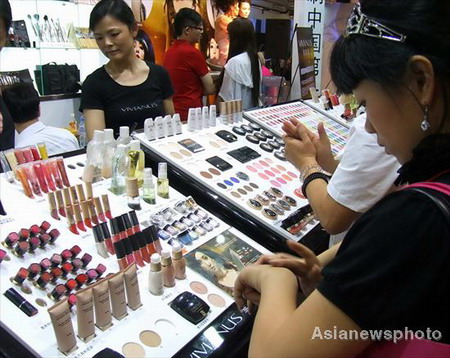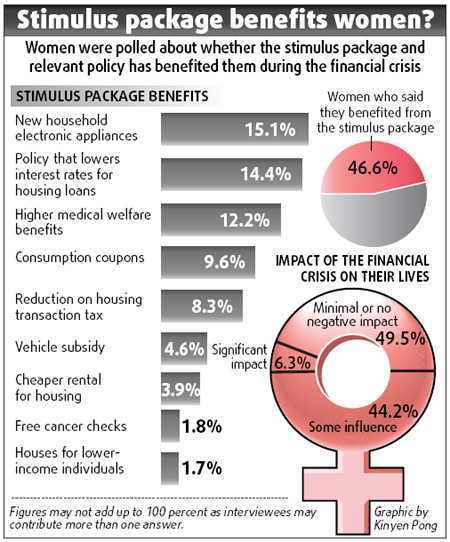Stimulating Consumption
What crisis? Women happy to spend
By Wang Zhuoqiong (China Daily)
Updated: 2009-11-06 08:33
|
 Women buy cosmetics at a department store in Shanghai. [Asianewsphoto] |
While the world is saving, Chinese women are spending.
Spurred on by rebates and the trickle down of the country's stimulus package, Chinese housewives, who traditionally control the pockets of their families, are buying the latest fashions, investing in stocks and traveling.
"Chinese women often dominate spending in their family," said Han Xiangjing, vice-council director of Huakun Woman Consumption Center, a branch of Women of China magazine.
"They serve as a major indictor of the consumption level in the country," Han said.
The magazine conducted a survey of 1,200 women aged 20 to 60 from 10 cities between August and October.
According to the survey, 46 percent of Chinese women feel they have benefited from the continuous growth of the Chinese economy, burgeoned by the country's 4-trillion-yuan ($586 billion) stimulus package.
Of those who considered their lives better as a result of the stimulus, 15 percent purchased new household electronic appliances because of policies encouraging the replacement of old appliances with new ones.
Others benefited from policies lowering interest rates for housing, an increase in medical welfare payments and vehicle subsidies.
Li Yun, 29, a UK-educated purchasing manager in an international pharmaceutical company in Beijing, bought a 90-sq-m apartment last December and is expecting to purchase a car next year.
"My salary was raised despite the global financial crisis, which gave me confidence to afford a mortgage and other large items," said Li, who spent her honeymoon in the Maldives last month.
Han said the favorable altitude towards the economy is strong in contrast with the gloomy economic clouds that swirled around Chinese women last year.
| ||||
But this year, just less than half said there is little to no negative impact on their quality of life.
Clothes rank first in personal consumption among women, followed by digital products, travel and cosmetics.
Women are also becoming more economically savvy, with 56 percent having invested this year: 22 percent on stocks, 21 percent on funds and 15 percent on the property market.
"How much I spend largely depends on how much my husband earns," joked Liu Jing, a saleswoman in a logistics firm in Beijing.
With a monthly income of 15,000 yuan, Liu and her husband said every bill will add an additional burden to their mortgage and other expenditures if they have a baby in the next year or two.
The 30-year-old said that living in Beijing she always feels the need to save rather than spend.
Nearly one-third interviewed did not feel their lives were affected by the economic crisis and they spent as they pleased.
"Chinese love to save," Han said. "So it comes as a big surprise to see more people now are willing to spend."
Savings as a percentage of income dropped to 24 percent this year from 54 percent in 2007.














